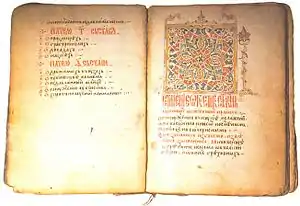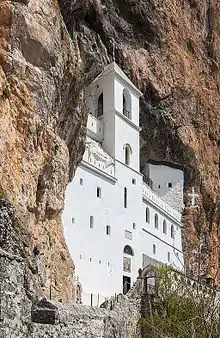Monastery of St. Mark of Koriša
Monastery of St. Mark of Koriša (Serbian: Манастир Свети Марко Коришки / Manastir Sveti Marko Koriški, Albanian: Manastiri i Markut të Shenjtë, Korishë) was a Serbian Orthodox monastery, built in 1467, located in Koriša, Prizren, Kosovo[a]. The entire complex was declared a Protected Monument of Culture in 1959, and it is de jure protected by Republic of Serbia.[2] It was a single-nave church, built on a rectangular foundation. It was severely damaged after the end of the Kosovo War in 1999.[2]
| Saint Mark Koriški Monastery Црква Светог Марка Коришког | |
|---|---|
| Religion | |
| Affiliation | Serbian Orthodoxy |
| District | Prizren |
| Ecclesiastical or organizational status | Damaged in summer 1999 |
| Leadership | Serbian Orthodox Church |
| Location | |
| Location | Kosovo[a] |
| Geographic coordinates | 42.25455°N 20.79822°E |
| Architecture | |
| Completed | around 1467 |
| Materials | Stone |
| Official name: Manastir sa Crkvom Sv. Marka | |
| Type | Monument of Culture |
| Designated | 9 August 1965[1] |
History
The ruins of the monastery of St. Mark of Koriša stands on a rocky outpost above the Koriša river near the village of Koriša, near Prizren.[3] According to preserved documents, the monastery was built by Jovan and Branko Vlahić in 1467, and it was a metochion (granted church land) to the Hermitage of St. Peter of Koriša, built in the 13th century.[3] The monastery is mentioned in the Ottoman defter of 1520.[3] It was abandoned in the 16th century, and reactivated in the 17th century.[3] In 1765, monk Neofit brought "many books from Dečani".[3]
In 1779, Partenije Popović was a monk at the monastery, whither he brought several important medieval books and manuscripts.[4] In 1859, a schoolteacher in Prizren, Nikola Musulin, found Dušan's Code, the constitution of the Serbian Empire. The following year the charter of the Monastery of the Holy Archangels also issued by Stefan Dušan was found in St. Nicholas Church of Koriša.[5] On the western side, above the rock, a belfry with two bells was added in 1861 as a foundation of Sima Andrejević.
After that, monastery was almost abandoned up until 1995, when monastery life restarted. In 1999, the monastery was vandalized and set on fire,[6] when the preserved fragment of the original fresco was destroyed. The monastery had a valuable library.
Gallery
 One of the oldest manuscripts of Dušan's Code, "Prizren Manuscript" was kept in Saint Mark Koriški Monastery
One of the oldest manuscripts of Dušan's Code, "Prizren Manuscript" was kept in Saint Mark Koriški Monastery
See also
Notes and references
Notes:
| a. | ^ Kosovo is the subject of a territorial dispute between the Republic of Kosovo and the Republic of Serbia. The Republic of Kosovo unilaterally declared independence on 17 February 2008. Serbia continues to claim it as part of its own sovereign territory. The two governments began to normalise relations in 2013, as part of the 2013 Brussels Agreement. Kosovo is currently recognized as an independent state by 98 out of the 193 United Nations member states. In total, 113 UN member states recognized Kosovo at some point, of which 15 later withdrew their recognition. |
References:
- Serbian Academy of Sciences and Arts 2006.
- Monuments of Culture in Serbia: Манастир са црквно Св. Марка (SANU) (in Serbian and English)
- "Pomozite manastiru Svetog Marka Koriskog". KIM-info. August 7, 2005. Archived from the original on May 1, 2011.
- Slovo, No. 18, p. 45 (in Serbian)
- Radovanović 2008, p. 268
- Veselin Kesich. "VI". Kosovo in the History of the Serbian Church.

